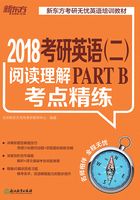
2012年新题型真题
Directions: Read the following text and answer the questions by finding information from the left column that corresponds to each of the marked details given in the right column.There are two extra choices in the right column.Mark your answer on ANSWER SHEET 1.(10 points)
“Universal history,the history of what man has accomplished in this world,is at bottom the History of the Great Men who have worked here,”wrote the Victorian sage Thomas Carlyle.Well,not any more it is not.
Suddenly,Britain looks to have fallen out with its favourite historical form.This could be no more than a passing literary craze,but it also points to a broader truth about how we now approach the past: less concerned with learning from forefathers and more interested in feeling their pain.Today,we want empathy,not inspiration.
From the earliest days of the Renaissance,the writing of history meant recounting the exemplary lives of great men.In 1337,Petrarch began work on his rambling writing De Viris Illustribus—On Famous Men,highlighting the virtus(or virtue)of classical heroes.Petrarch celebrated their greatness in conquering fortune and rising to the top.This was the biographical tradition which Niccolò Machiavelli turned on its head.In The Prince,he championed cunning,ruthlessness,and boldness,rather than virtue,mercy and justice,as the skills of successful leaders.
Over time,the attributes of greatness shifted.The Romantics commemorated the leading painters and authors of their day,stressing the uniqueness of the artist's personal experience rather than public glory.By contrast,the Victorian author Samuel Smiles wrote Self-Help as a catalogue of the worthy lives of engineers,industrialists and explorers.“The valuable examples which they furnish of the power of self-help,of patient purpose,resolute working,and steadfast integrity,issuing in the formation of truly noble and manly character,exhibit,”wrote Smiles,“what it is in the power of each to accomplish for himself.”His biographies of James Watt,Richard Arkwright and Josiah Wedgwood were held up as beacons to guide the working man through his difficult life.
This was all a bit bourgeois for Thomas Carlyle,who focused his biographies on the truly heroic lives of Martin Luther,Oliver Cromwell and Napoleon Bonaparte.These epochal figures represented lives hard to imitate,but to be acknowledged as possessing higher authority than mere mortals.
Not everyone was convinced by this bombast.“The history of all hitherto existing society is the history of class struggle,”wrote Marx and Engels in The Communist Manifesto.For them,history did nothing,it possessed no immense wealth nor waged battles:“It is man,real,living man who does all that.”And history should be the story of the masses and their record of struggle.As such,it needed to appreciate the economic realities,the social contexts and power relations in which each epoch stood.For: “Men make their own history,but they do not make it just as they please; they do not make it under circumstances chosen by themselves,but under circumstances directly found,given and transmitted from the past.”
This was the tradition which revolutionised our appreciation of the past.In place of Thomas Carlyle,Britain nurtured Christopher Hill,EP Thompson and Eric Hobsbawm.History from below stood alongside biographies of great men.Whole new realms of understanding—from gender to race to cultural studies—were opened up as scholars unpicked the multiplicity of lost societies.And it transformed public history too: downstairs became just as fascinating as upstairs.
41.Petrarch
42.Niccolò Machiavelli
43.Samuel Smiles
44.Thomas Carlyle
45.Marx and Engels
A.emphasized the virtue of classical heroes.
B.highlighted the public glory of the leading artists.
C.focused on epochal figures whose lives were hard to imitate.
D.opened up new realms of understanding the great men in history.
E.held that history should be the story of the masses and their record of struggle.
F.dismissed virtue as unnecessary for successful leaders.
G.depicted the worthy lives of engin-eers,industrialists and explorers.
答案解析
41.A【解题思路】本题要求找出Petrarch在文中的观点,Petrarch的观点只出现在文章第三段第二句和第三句中。这两句话指出,1337年,Petrarch开始断断续续地写《名人列传》,他在书中突出表现了历史英雄人物的美德(highlighting the virtus...of classical heroes),称颂他们在把握自己命运与奋斗到社会顶层的过程中所体现出来的伟大之处(celebrated their greatness in conquering fortune and rising to the top)。七个选项中,A选项emphasized the virtue of classical heroes是文中highlighting the virtus...of classical heroes的同义表述,故为本题答案。
42.F【解题思路】本题就Niccolò Machiavelli的观点提问,故可定位至文章第三段。该段第四句指出,Niccolò Machiavelli彻底改变了这一传记的写作传统(This was the biographical tradition which Ni c co lò Ma chiave l li tu r ne d on i t s hea d.),其中 t he bio g ra p hi ca l t ra di tion指代本段第二句和第三句中提到的Petrarch在他所写的传记中强调英雄美德的传统。接着第五句又指出Machiavelli在《君主论》一书中支持(championed)以下观点:狡猾、冷酷和具有冒险精神是伟大领导应具备的素质,而不是美德、怜悯以及公平公正之心。故由此可知,Machiavelli对美德很不屑,认为其并不是成功的领导者必须具备的品质,故选项F为答案。
43.G【解题思路】本题要求选出符合Samuel Smiles观点的选项,故可定位至文章第四段。该段指出,维多利亚时期的作家Samuel Smiles所著的《自助论》就是一本专门记录工程师、实业家和探险家的卓越人生的书籍(Samuel Smiles wrote Self-Help as a catalogue of the worthy lives of engineers,industrialists and explorers),选项G的表述与此一致,故为答案。
44.C【解题思路】本题要求选出符合Thomas Carlyle观点的选项,在文中第一段、第五段以及最后一段中都提到过Thomas Carlyle的观点,故可定位至这三段。第一段直接引用了Thomas Carlyle的话,指出:世界史是记录人类在世界上取得成就的历史,是记录伟人的历史。七个选项中没有一个选项与此对应。接下来看第五段,该段提到Thomas Carlyle的传记主要写的是如马丁·路德、奥利弗·克伦威尔以及拿破仑·波拿巴等英雄人物的人生(who focused his biographies on the truly heroic lives...),而这些划时代的人物有着不可复制的人生经历(These epochal figures represented lives hard to imitate),选项C的表述与此完全相符,故为答案。
选项D在文中最后一段中出现过,该段第二句和第三句指出,Thomas Carlyle认为英国培育了Christopher Hill、EP Thompson和 Eric Hobsbawm。底层人民的历史与伟人们的传记是共存的。接着第四句指出诸如性别、种族和文化研究等全新的理解领域(new realms of understanding)向学者们敞开。由此可知,向学者们敞开的是了解底层人民历史这一全新领域,而不是了解历史上伟人们的全新领域,且文中并没有信息表明Thomas Carlyle开创了一个全新的理解领域,故选项D可排除。
45.E【解题思路】本题要求选出与马克思和恩格斯的观点相符的选项,故可定位至文章第六段。
该段指出,马克思和恩格斯认为,历史并没有造就什么,既没创造财富,也没有发动战争,一切都是人类所为。因此历史应该记录人民群众的故事,应该记录他们的奋斗史(And history should be the story of the masses and their record of struggle),选项E的表述与本段第四句的表述相符,故为答案。
选项B是根据文章第四段第二句设置的干扰项,该句指出,浪漫主义者纪念的是他们那个时代杰出的画家及作家,他们强调艺术家们独特的个人经历,而不是他们的功绩(stressing the uniqueness of the artist's personal experience rather than public glory),选项B恰好与文意相反,而且也不属于左栏中人物的观点,故可排除。
参考译文